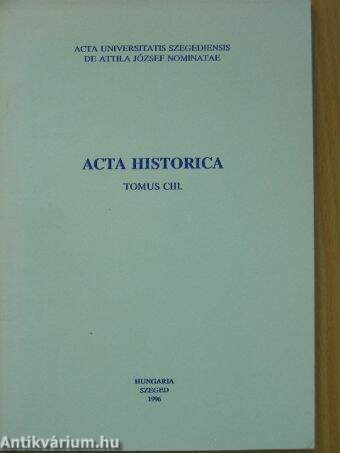1.034.226
kiadvánnyal nyújtjuk Magyarország legnagyobb antikvár könyv-kínálatát

VISSZA
A TETEJÉRE
JAVASLATOKÉszre-
vételek
Acta Historica Tomus CIII.
| Kiadó: | Hungaria |
|---|---|
| Kiadás helye: | Szeged |
| Kiadás éve: | |
| Kötés típusa: | Ragasztott papírkötés |
| Oldalszám: | 123 oldal |
| Sorozatcím: | Acta Universitatis Szegediensis de Attila József Nominatae |
| Kötetszám: | |
| Nyelv: | Magyar |
| Méret: | 24 cm x 17 cm |
| ISBN: | |
| Megjegyzés: | Megjelent 400 példányban. Angol, német, orosz, összefoglalókkal. |
naponta értesítjük a beérkező friss
kiadványokról
naponta értesítjük a beérkező friss
kiadványokról
Előszó
SLAVS IN FREDEGAR: MEDIEVAL 'GENS' OR NARRATIVE STRATEGY?' It is often said that reports of early medieval sources on any aspect of social or political life should be understood within the early... TovábbElőszó
SLAVS IN FREDEGAR: MEDIEVAL 'GENS' OR NARRATIVE STRATEGY?' It is often said that reports of early medieval sources on any aspect of social or political life should be understood within the early medieval mind-set. What did medieval authors mean by 'kings', 'peoples', 'nations', to mention only a few of the most controversial concepts used, where did they obtain their information about the 'others', be they peoples from afar or rulers from the more or less remote past? Questions of this kind are rarely asked by historians, particularly by those involved in research on medieval ethnicity. Philologically-oriented historical studies usually ignore the forest for the trees, while historical anthropologists accept the face-value of the text, often in its translated version, for granted. The current historiographical view about Christian historians of the 500s and 600s is that, while transforming historiography in the image of the Christian faith and into a form fitting the new world of successor kingdoms, they applied to history the causal cycle of sin followed by punishment as a means of interpreting events.1 In relation with each other, but particularly with the described 'kingdom' or 'nation\gentes are thus arranged in history according to the divine plan. It would however be a gross mistake to interpret any gens as being a mere agent of God's wrath or reward for the people whose history is to be written, be it Franks, Lombards, or Goths. Portrayals of gentes are not stereotyped by definition, as, for instance, Paul the Deacon's description of the Lapps can show.2 This complex relation between factual records and interpretive accounts further influenced modern historiographical views. F. M. Pelzel, the first author to claim Samo for the Slavic (Czech) history as early as the eighteenth century, simply transcribed Fredegar's Wendish account (IV 48 and 68). VisszaTartalom
Florin Curta: Slavs in Fredegar: Medieval „Gens" or Narrative Strategy? 3Kristó Gyula-H. Tóth Imre: Az orosz évkönyvek néhány magyar vonatkozásáról 21
Tóth Sándor László: Az első fejedelem: Árpád vagy Álmos? 31
SZÁNTÓ RICHÁRD: Spanyolországi források a kalandozó magyarok 942. évi hadjáratáról 43
KRISTÓ Gyula: Új forráshely a 10. századi hercegségről? 51
kordé Zoltán: Néhány gondolat a Csaba-problémáról 57
KOSZTA LÁSZLÓ: Székeskáptalanok és kanonokjaik Magyarországon a 12.
század elejéig 67
Dávid Tamás: Kapisztránói János és a bártfai Irgalmasság Anyja confraternitás
kapcsolata 83
Petrovics István: Egy 14. századi temesvári bíró: Posztós Mihály 91
Tóth Sándor László: A Porta és a tizenöt éves háború kitörése 101
LELE JÓZSEF: Erdély esélyei (Báthori András fejedelemsége, 1599) 113
Megvásárolható példányok
Nincs megvásárolható példány
A könyv összes megrendelhető példánya elfogyott. Ha kívánja, előjegyezheti a könyvet, és amint a könyv egy újabb példánya elérhető lesz, értesítjük.



